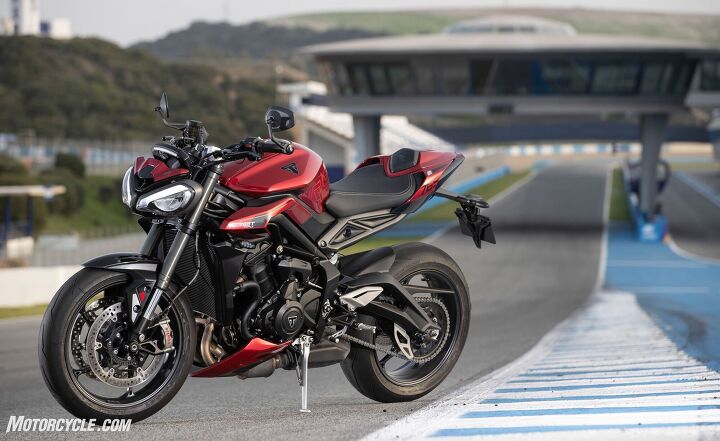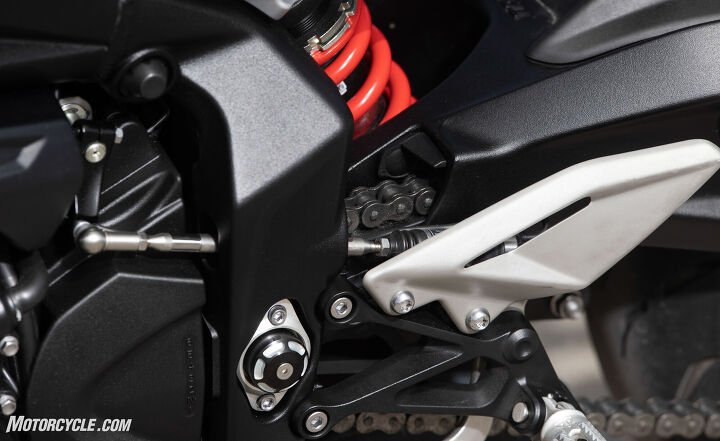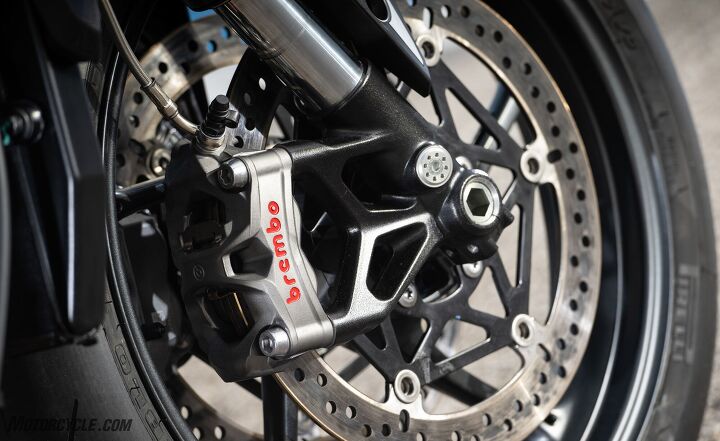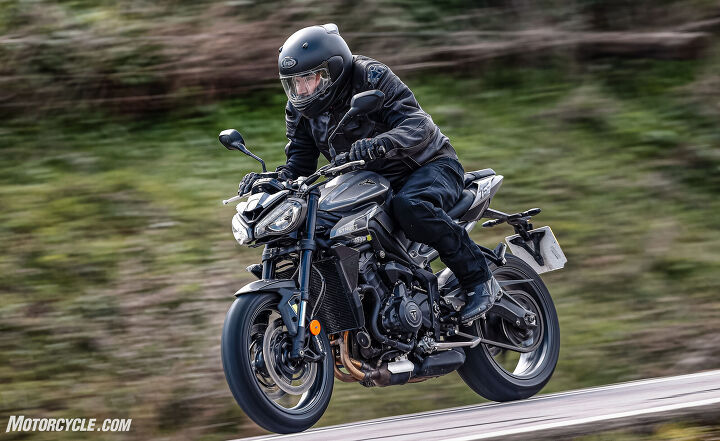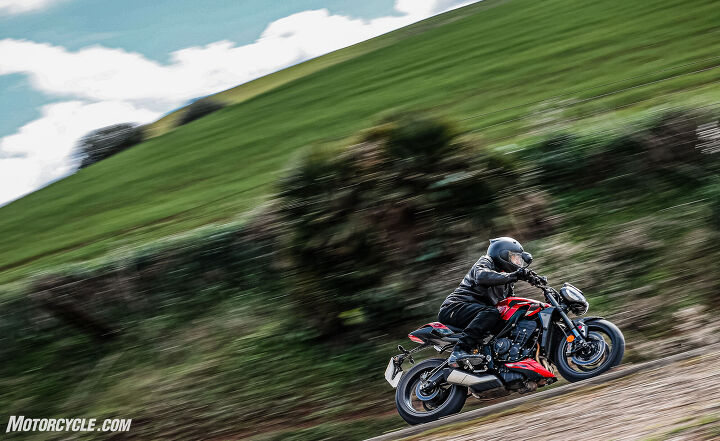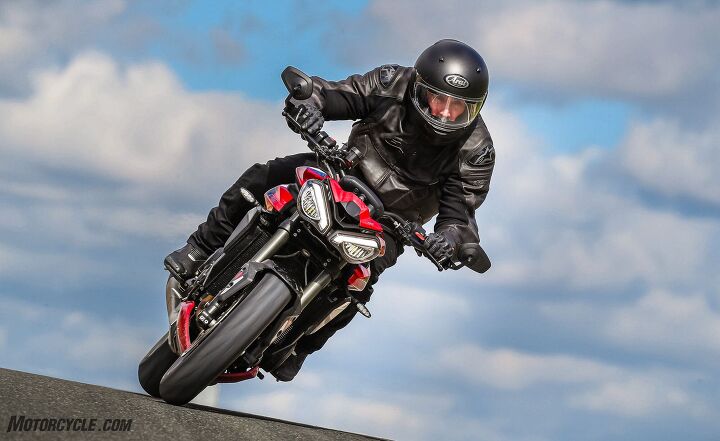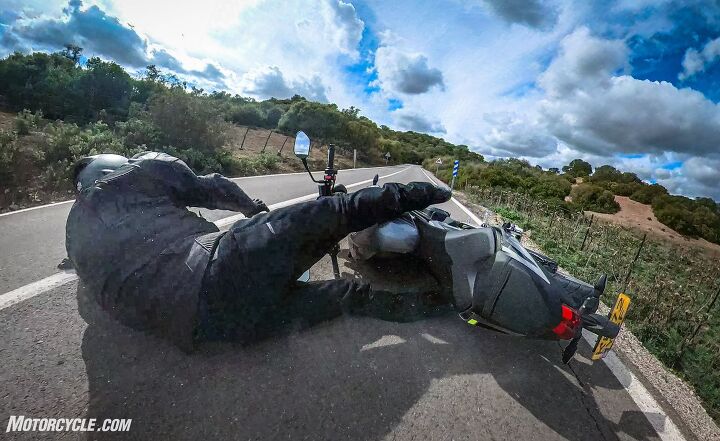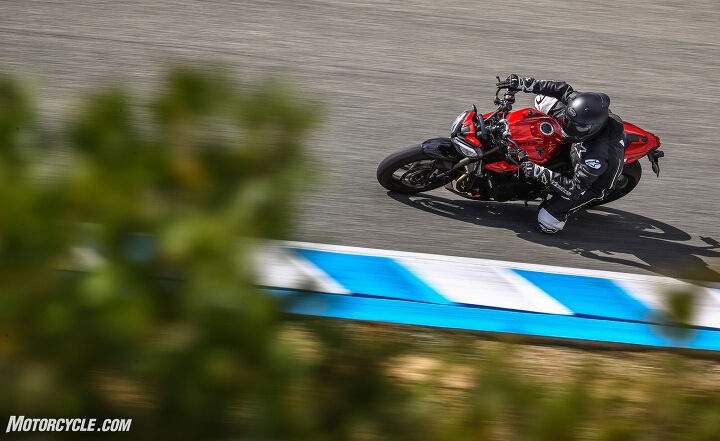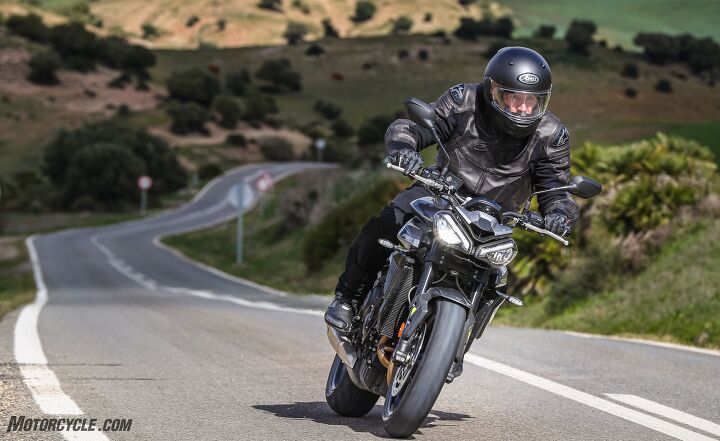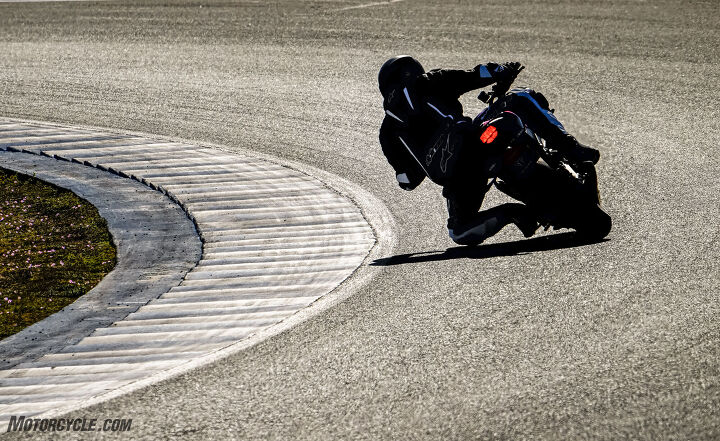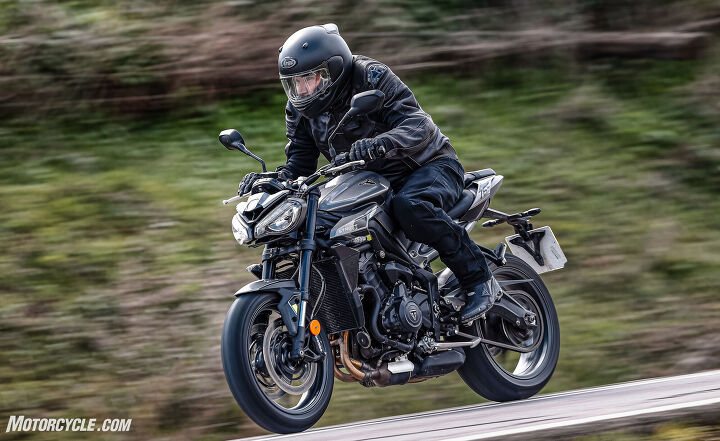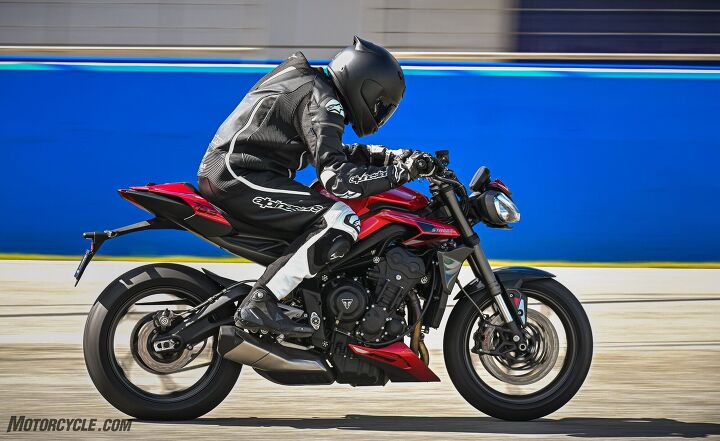Motorsports Racing News & Blog Articles
2024 Triumph Street Triple 765 R/RS Review – First Ride
For the previous week, I’d anxiously checked the weather reports for updates. Sandwiched in between swaths of little sun icons were two little black clouds spewing raindrops. Naturally, those were the scheduled dates for the US press to ride the 2024 Triumph Street Triple 765 R and RS on the Andalusian backroads and the famed Circuito de Jerez Angel Nieto in southern Spain.
2020 Triumph Street Triple 765 RS Review – First Ride
2017 Triumph Street Triple RS Review: First Ride
2013 Triumph Street Triple R Review
2012 Triumph Street Triple R Review
2008 Triumph Street Triple 675 Review
And my wishes were granted. The rain plowed through the night before the first ride day, leaving drying roads and temperatures gradually rising from the mid-40s to the low-50s through our street ride. Once the day’s photography was done and with the tarmac finally dry – if a bit dusty – the pace picked up to the point that I felt, rather than tiptoeing around the wet spots, we were really getting to sample the engine’s new power delivery and chassis’ refinement. The roads, though bumpy in places, were an intoxicating mix of extended sections of high-speed sweeping corners with brief, more technical portions to feel the chassis’ sprightliness. In a short series of esses, I aggressively rolled on the throttle at the exit of a second gear, 50 mph left hander, my ears full of the seductive growl of the 765cc Triple, a smile growing on my lips, and without warning, the front end folded…
2024 Triumph Street Triple 765 R/RSEditor Score: 93.5%
| Engine | 18/20 | Suspension | 13/15 | Transmission | 9.25/10 |
| Brakes | 9/10 | Instruments | 8.75/5 | Ergonomics | 9/10 |
| Appearance | 9.5/10 | Desirability | 9/10 | Value | 8/10 |
| + Highs More power! (128 hp RS, 118 hp R) Premium Brembo brakes (RS) Öhlins STX40 shock (RS) | – Sighs Increased peak horsepower only accessible at the track (RS) 6,000 mile valve-adjustment interval While powerful, R’s brakes lack immediacy of RS’ premium Brembo system R’s Continental ContiRoads can’t compare to RS’ Pirelli Diablo Supercorsa SP V3 performance |
From its 2007 inception, the Street Triple has been extremely popular among journalists and riders alike. With milestone models in 2008, the introduction of the R; 2013, the introduction of ABS on a new chassis; 2015, the release of the RX model plus the inclusion of a quickshifter and Daytona subframe; 2017, introducing a new 765cc engine in a three-model family (S, R, and RS); and 2020, highlighting 9% more midrange along with Brembo brakes, Öhlins suspension, and up/down quickshifter. With each update, the sporting credentials of the Street Triple were sharpened without compromising the upright, naked-bike riding position. To date, Triumph has sold over 130,000 units around the world.
While the rest of the world will see the newest Street Triple as a 2023 model, the US will see the same bike, at the same time, as a 2024 model due to some bureaucratic nonsense. Regardless, Street Triple fans around the world have something to be excited about. In a true trickle down of race technology, Triumph has applied the knowledge gained from its Moto2 development of the 765cc Triple spec engine to the street. Additionally, the rest of the bike’s capabilities have been sharpened to match. Finally, while a Moto2 version of the Street Triple was on hand for journalists to look at, we were not allowed to ride them since the limited run had already been snapped up by the public.
From Moto2 to the Street
Triumph deems the upgrades made to the engine bay significant, and by the time we’re done here, you’re likely to agree. Let’s get the party started by looking at the combustion chamber which was altered to give a 4.7% bump in the compression ratio to 13.25:1. To achieve this lofty number, the formerly cast piston crowns receive the benefit of machining. Deeper valve cutouts and careful reshaping of the pistons mate to a cylinder head that is machined to these closer tolerances, while the 78.0 mm bore and 53.4 mm stroke remain unchanged.
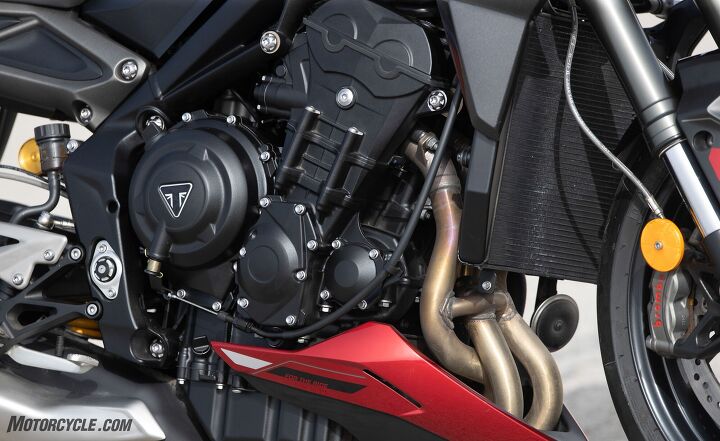
A modified combustion chamber coupled with shorter gearing make for snappy acceleration. The chin fairing is standard on the RS. One surprising feature of the updated engine is the relatively short 6,000 mile valve-adjustment interval.
The result of this machining of the heads is higher flow intake ports with a larger cross-sectional area. In fact, the ports are only lacking the final hand polishing when compared to the Moto2 engine. Astute readers will suspect that the deeper cutouts in the piston crown mean that the valve lift has also increased. Naturally, the same logic would follow that the cams and cam timing were also massaged. In order to accommodate the larger forces generated in the combustion chamber, stronger rods and pins were utilized.
The increased flow of the combustibles and the byproducts wasn’t just handled inside the engine. The intake trumpets in the airbox were shortened by 20mm (0.79 in.) for better top end, while the exhaust flow rate was improved by utilizing a single catalyst instead of the two previously incorporated. A nice side-effect of the single catalyst is that it saves weight, too.
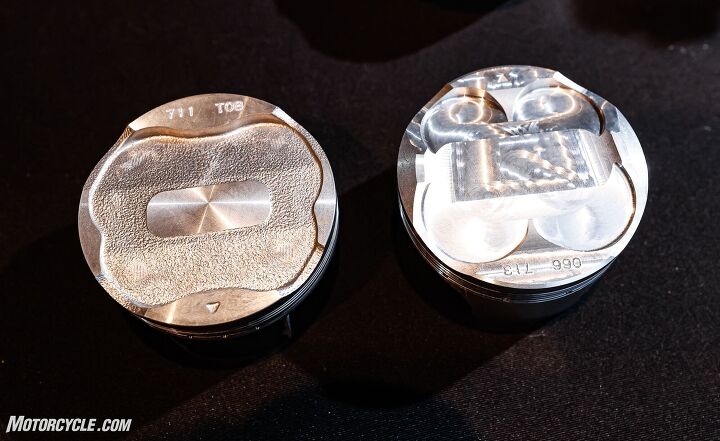
The differences between the cast piston of the previous generation and the new machined one are plain to see. Those ridges on the outside of the new piston help to increase the compression.
Now, we get to the differences between the R and the RS in power output. From the dyno charts below, we can see that the R gets significant horsepower gains from 5,000 rpm up to peak hp. In fact, the R’s power curve looks quite similar to last year’s RS, though at 118 hp, it has a slightly lower peak. Triumph claims that the only difference between the two models’ power output is in the tuning, not the hardware. The tuning that delivers the increased top end power (128 hp!) also adds a modicum of power in the midrange, but this slight increase would be hard to feel from the saddle. However, the improved smoothness of the curve is noticeable. Similarly, while the torque peak grew to 59 lb-ft, its improved smoothness from 4,000 rpm to the 9,500 rpm peak plays a key role in the ST’s exciting acceleration.

The Street Triple R’s dyno chart (left) shows gains in the midrange over the previous model year. While the RS has a significant gain up top, the midrange power delivery is not significantly larger, but it is noticeably smoother.
Newfound power is always good, but the source of the most noticeable change in the Street Triple’s acceleration gets credited to the shorter gearing. While first gear is slightly taller, the snappy throttle response owes a lot to the shorter ratios in second through sixth gears. Additionally, the final drive was shortened. When combined with the silky-smooth fueling, the Triple leaps out of corners with a ferocity that suits the sexy engine growl.
Quickshifter, IMU, and ABS – oh my!
For the first time, all Street Triple models receive quick shifters as standard equipment. Utilizing the sensor module from the Speed Triple 1200, the quickshifter is more than an on/off switch to aid in shifting gears. The technology has advanced to the point that the pressure on the shift lever and the speed at which it is being moved are added (in addition to the usual factors of speed, engine speed, throttle position, and rate of throttle change) into the algorithm that dynamically determines the changes to the engine’s power to facilitate the best up-/down-shifts.
But in the interest of a transitional paragraph, I have buried the lede about the Street Triple’s electronics. An IMU is finally included in the package, allowing for cornering ABS and lean-sensitive TC – features that were quite noticeably absent from the 2020 update. For this change, Triumph turned to Continental for IMU and ABS technology. The ABS modulator utilizes a built-in six-axis IMU for compact packaging. The result is what Triumph calls Optimized Cornering ABS and Optimized Cornering Traction Control.
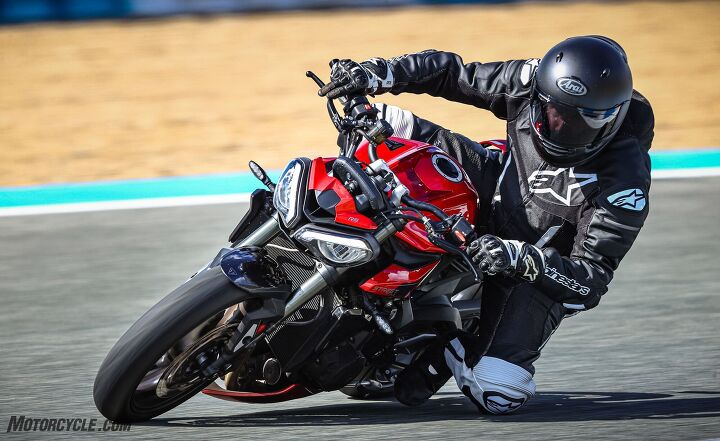
At the exit of a corner when you straighten the Street Triple up while hard on the gas, the front wheel really wants to lift. Charging down the straight with the TC light flashing and the front tire skimming the pavement becomes the norm as the Track mode tries to optimize the acceleration.
Both the Street Triple’s ABS and TC have separate settings that are linked to specific ride modes and are predictive, thanks to the IMU, rather than reactive, as they were with the previous generation. This is a very big deal. The R and the RS both have Rain, Road, Sport, and Rider modes (for user-programmable settings), and the three standard modes all have bespoke cornering ABS and TC settings, with the most restrictive being Rain. (As an aside, Rain mode limits the power to approximately 100 hp, while the others deliver full power with varied throttle mapping.) Another interesting note about these modes is that the ABS module links the front and rear brakes in that when the front brake is applied, a small amount of rear brake is used to settle the chassis. The reverse is not true, and the rear brake application has no influence on the front.
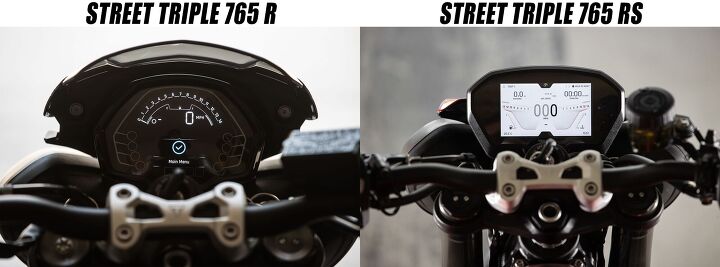
The Street Triple R (left) does have a small TFT combined with an LCD, but the superior 5-in. TFT on the RS is part of the model’s premium appeal.
The RS also has a Track mode, which bears some discussion. In Track mode, Cornering ABS is discontinued, as is the link between the front and rear brakes. Additionally, significantly more slip is enabled in both braking and acceleration before software intervention. Riders who charge corners with the front brakes at the limits of the tire’s adhesion will benefit from these new settings, which unlike with the previous generation, require the tire to be actively sliding before ABS kicks in. While all modes have wheelie control (except Rider, which is switchable), Track allows for front wheel lift, to a point, under acceleration. Since Track mode is designed to let the rider squeeze the most performance possible out of the bike, wheelie control is retained to support maximum acceleration, since lifting the front wheel more than slightly above the pavement only serves to limit acceleration.
Chassis changes
The changes from the previous iteration of the Street Triple to the 2024 version are slight but important – and they differ for the R and RS. For example, the R’s rake is shortened to 23.7°, which is steeper than last year’s RS 23.9° measurement. The same goes for the trail, which is now 3.85 in. versus 3.94 in. The RS’ numbers are even sportier at 23.2° and 3.82 in. Additionally, the rear of the RS was raised, resulting in a 32.9-in. seat height, 0.4-in. higher than the R’s 32.5-in seat. Aiding in the sporting feel of the riding position, a 12 mm (0.5 in.) wider handlebar was lifted from the Speed Triple 1200. Both models put the rider in an aggressive, upright position for attacking corners. Wind protection, as before, is practically nonexistent but doesn’t really become an issue until around 120 mph.
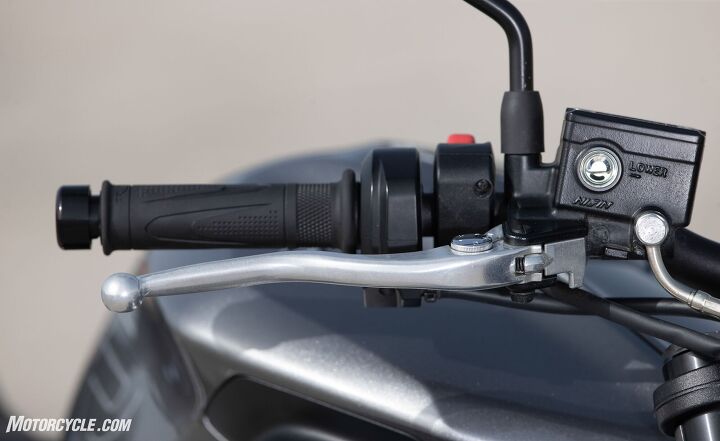
While a lower spec than the Brembo MCS on the RS, the R’s Nissin axial master cylinder is no slouch.
Braking is another area where the R and RS diverge. While both sport 310 mm discs up front, their calipers and master cylinders differ. The R receives a set of the venerable Brembo M4.32 4-piston radial monobloc calipers and a Nissin axial master cylinder, while the RS receives the calipers of the moment, Brembo Stylema 4-piston radial monoblocs, actuated by a slick Brembo MCS radial master cylinder. The only brake complaint echoed by any of the riders that I heard concurred with my gripe about the MCS’ adjustable lever still being too far from the grip when in its closest position.
Following the trend between the two models, the suspension of the R is of a lower spec than that of the RS. The R’s suspenders consist of a Showa 41 mm USD Separate Function, Big Piston fork in the front and a Showa piggyback reservoir monoshock out back. Both are fully adjustable. The RS benefits from a higher-spec Showa 41 mm upside down Big Piston fork and an Öhlins STX40 piggyback reservoir monoshock. While the forks both have 4.5-in. travel, the R’s shock allows for 5.3-in. travel. Surprisingly, the RS’ rear wheel travel is 5.2 in. Finishing out the 2024 Street Triple’s rolling gear is a set of Continental ContiRoad tires on the R and Pirelli Diablo Supercorsa SP V3 tires on the RS. Both versions are sized 120/70 ZR 17 and 180/55 ZR 17, front and rear, respectively.
Putting the changes to the test
When we last saw our hapless protagonist, the handlebar had folded all the way to the stop, leaving him with little option other than letting the laws of physics run their course. But let’s rewind the tape to a place where we can actually discuss the performance of the Street Triple’s capabilities and not the rider’s shortcomings.
Day one of the introduction was a street ride on the Andalusian backroads near the Jerez circuit. Because of heavy rain for most of the night before and morning temperatures in the low 40s, the initial pace was quite sedate on the still-wet roads. I was happy to wait for higher temperatures and drier conditions before hustling the RS into the corners, because Supercorsa SPs are not traditionally known for their wet-weather grip. Fortunately, the bikes were outfitted with accessory heated grips, which made a huge difference in the early stages of the ride.
On the street, both the R’s and the RS’ engines feel virtually identical, despite the difference in the top-end power. This is to be expected on the street. With both mills, the fuel mapping was glitch free, allowing for careful modulation of the throttle on the sometimes quite wet pavement. As the day dried out and the temperatures warmed up into the 50s, the pace did, too.
I noticed the biggest difference between the bikes in the brakes. The Brembo MCS master cylinder, despite the slightly long reach, delivered immediate braking at the initial move of the lever. This was not abrupt but rather gave me the ability to vary my braking power over the largest possible range. Additionally, the lever ratio could be altered over three clicks from 19-21mm, with 19 mm giving the most feel and 21 mm a firmer lever. In the dodgy conditions, I opted for 19 mm. From the first corner with the RS, I felt immediately comfortable with the brake system, trusting it to give me the modulation to brake deeply into corners.
The R’s axial master cylinder offered lever adjustments that better fit my hand, but it had a slight dead space between the initial lever movement and brake actuation – which is exactly why radial master cylinders were developed.. Not a huge deal, but noticeable. However, when it got into the meat of the braking stroke, the master cylinder and the M4.32 calipers offered plenty of power. The lever feel was on par with the R’s more expensive sibling, and although I only rode the bike on completely dry roads, I was confident in my trail braking.
The roads in this portion of Andalusia can be quite bumpy at times, and consequently, our Triumph hosts had set the suspensions up in comfort settings to allow them to soak up the bumps. While this was appreciated over the sometimes broken pavement, the side effect of such soft settings was an excess of chassis pitch that had the bikes pitching forward under braking and squatting under hard acceleration and wanting to run wide at the exits. For the most part, this was not an issue until the pavement dried out and the pace hotted up to speeds that better go unmentioned. Even with the soft suspension, the easier turn in was noticeable on the street and instilled confidence.
Gravity works
After lunch and the final photo stop, the lead riders felt comfortable enough to pull the trigger, and the pace reached its quickest of the entire day. Since I had mounted an Insta360 cam on a pole off of the back of the Street Triple R I was riding, I dropped back from the lead pack, while still maintaining a pretty brisk pace and enjoying myself to the fullest. At the exit of an S-turn, aggressively rolling on the throttle as the road opened up before me, we finally return to the place in time where this article started.
While I take full responsibility for my crash, some key components of the crash should be noted – with the caveat that I failed to manage them effectively. First, the road was quite dusty, with an ambient temperature in the low- to mid-50s. Since the suspension was soft and I was actively rolling on the throttle, the bike’s weight had shifted rearward, lessening the downforce that the relatively hard ContiRoad rubber had to work with to generate traction. So, when I early apexed the second corner, I set myself up to run slightly wide at the exit. And here is my second mistake: I tried to add more lean while accelerating in conditions in which traction was less than optimal. So, while taking full blame for the actions that sent me skittering down the pavement, I still think that the grippier rubber of the Supercorsa SPs might have let me pull this maneuver off without incident. My reasoning for this statement is that prior to the crash, I’d had more squirms from the Continentals in the dry than I had with the Pirellis in the transitional conditions earlier in the day. We, however, will never know.
My street testing of the 2024 Triumph Street Triple 765 R ended with the Ride of Shame in the front seat of the chase van. Liability concerns dictated that I get checked out at the medical center before I could throw a leg over another company motorcycle. The Street Triple crashed quite well with damage on the left grip, turn signal, engine case, and both rider and passenger pegs. Other than a slightly sore shoulder and lower back – thanks to the Tech-Air 5 deployment – both myself and the bike could have ridden back to Triumph’s base of operations at Jerez.
Track redemption
I won’t lie. I started the first session on the famed Jerez circuit with butterflies and grit teeth. My muscles were a little stiff, and I was determined not to be “that guy” by crashing again. However, spending a night thinking about and discussing with friends gave me a clear idea of what had caused my tumble. And what to avoid.
For the track portion of the Street Triple introduction, Triumph only used the RS models. The primary reason was that Track mode was available and we would be running the Pirelli Diablo Supercorsa SP tires in their natural habitat. The track at Jerez is smooth, grippy, and quite fast. It has a good combination of high-speed turns and slowing down from and speeding up to those high speeds, an ideal environment to sample the RS’ improvements.
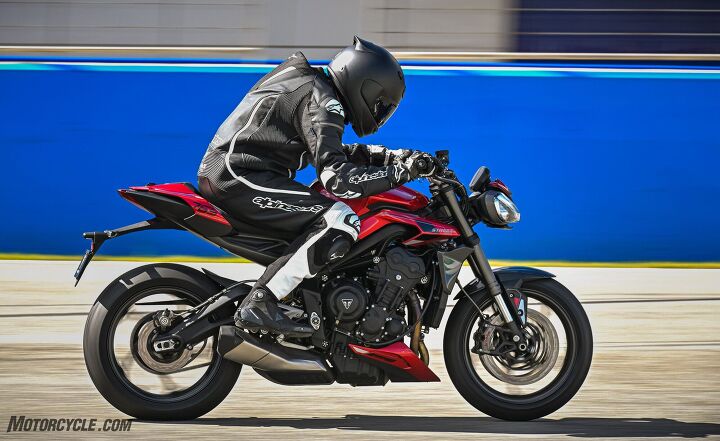
Accelerating down Jerez’ front straight highlights the top end power of the RS. Once above 120 mph, the lack of wind protection becomes a battle, and the tight confines of the seat prevent scooting back into a proper tuck.
My first impression of the RS on the track was how seamless the power is delivered. I could pick up the throttle while leaned way over in a second gear corner as smoothly as my wrist could roll on. Similarly, when downshifting from sixth gear while braking into a second gear corner, the shifts came fast and smooth. While a couple of riders complained about the quickshifter occasionally not allowing them to downshift at high rpm (thanks to over-rev protection), I think this is more a case of current/former superbike racers asking a bit too much from a street bike. With a mere mortal, like myself, at the grips, the problem never materialized.
In 2020 in Cartagena on the previous generation Street Triple, many of the faster riders complained about ABS interfering when they were trying to brake at the maximum on corner entry. With the 2024 model, I never heard anyone discuss interference from the new Track mode’s ABS settings that allow some tire slip. I, with my significantly reduced confidence from the previous day’s mishap, never approached that level of deceleration. What I can say is that the feel at the lever gave me confidence to carry my braking all the way to the apex, even while knowing that there would be no Cornering ABS nannies protecting me from becoming “that guy.”
In my first track session on the RS, the improved turn in was immediately apparent, but I was surprised to have the bike try to run wide at the exit. The harder I accelerated out of the corner, the more it wanted to run wide. This wasn’t a major problem and could be managed. Still, I was happy to discover that the issue disappeared in the second track session after the suspension settings were dialed to suit my American-sized proportions, and the bike stopped squatting under acceleration. (For those who are interested, compression and rebound were added in the front and just compression in the rear.) The range of adjustments that the RS’ suspension, which allowed both comfort and track settings, is really quite impressive. For a bike that will presumably spend most of its time on the street with occasional track days thrown in the mix, Triumph has delivered riders with a very versatile tool.
The ride home
In the 2024 Street Triple 765 family, Triumph has created motorcycles directed towards two very different riders. For those who want to commute and go out for occasional weekend blasts in the twisties, the Street Triple R has everything you need (though I’d opt for stickier rubber once the stock tires are done). The stout brakes may not be as sexy as those on the RS, but they more than get the job done – with ease. Having a bi-directional quickshifter as a standard feature on a bike priced at $9,995 is pretty nice, too. The color options are Silver Ice with Storm Grey and Yellow graphics or Crystal White with Storm Grey and Lithium Flame graphics.
The 2024 Triumph Street Triple 765 RS takes the base platform of the R and turns up the volume for a performance-focused rider. The premium brakes and suspension can be appreciated on every ride, and the 128 ponies get to stretch their legs at the track. The fact that the RS also has the 5-in. TFT instrumentation and premium Pirelli tires sweetens the pot. Although the RS does come at a $2,600 premium, the $12,595 MSRP makes sense for the up-spec hardware. The Street Triple 765 RS is heading towards showrooms now in three color schemes: Silver Ice with Baja Orange and Storm Grey graphics, Carnival Red with Carbon Black and Aluminum Silver graphics, and Cosmic Yellow with Carbon Black and Aluminum Silver graphics.
Does the middle-weight naked bike class have a new king? We’re already planning the next MOronic shootout. Stay tuned.
|
Street Gear
|
|
Track Gear Helmet: Arai Contour-X |
| Specifications | Triumph Street Triple 765 R | Triumph Street Triple 765 RS |
|---|---|---|
| MSRP | $9,995.00 | $12,595.00 |
| Engine Type | 765 cc Liquid-cooled, inline 3-cylinder | |
| Bore and Stroke | 78.0 mm x 53.4 mm | |
| Fuel System | Multipoint sequential electronic fuel injection with electronic throttle control | |
| Compression Ratio | 13.25:1 | |
| Valve Train | 12 valve, DOHC | |
| Transmission | 6-speed | |
| Final Drive | X-ring chain | |
| Front Suspension | Showa 41 mm upside down Separate Function Forks – Big Piston (SFF-BP), adjustable compression and rebound damping, and preload adjustment. 4.5-in. travel | Showa 41 mm upside down Big Piston Forks (BPF), adjustable compression and rebound damping, and preload adjustment. 4.5-in. travel |
| Rear Suspension | Showa piggyback reservoir monoshock, adjustable compression, rebound and preload adjustment. 5.3-in. travel | Öhlins STX40 piggyback reservoir monoshock, adjustable compression and rebound damping, and preload adjustment. 5.2-in. travel |
| Front Brake | Twin 310 mm floating discs, Brembo M4.32 4- piston radial monobloc calipers, OC-ABS | Twin 310 mm floating discs, Brembo Stylema 4-piston radial monobloc calipers, OC-ABS, Brembo MCS radial master cylinder |
| Rear Brake | Single 220 mm disc, Brembo single piston caliper, OC-ABS | |
| Front Tire | 120/70 ZR 17 Continental ContiRoad | 120/70 ZR 17 Pirelli Diablo Supercorsa SP V3 |
| Rear Tire | 180/55 ZR 17 Continental ContiRoad | 180/55 ZR 17 Pirelli Diablo Supercorsa SP V3 |
| Rake/Trail | 23.7°/3.9 in. | 23.2°/3.8 in. |
| Wheelbase | 55.2 in. | 55.08 in. |
| Seat Height | 32.52 in. | 32.91 in. |
| Curb Weight | 417 lb. (claimed, 90% fuel capacity) | 414 lb. (claimed, 90% fuel capacity) |
| Fuel Capacity | 3.96 gal | |
| Available Colors | Silver Ice with Storm Grey and Yellow graphics or Crystal White with Storm Grey and Lithium Flame graphics | Silver Ice with Baja Orange and Storm Grey graphics, Carnival Red with Carbon Black and Aluminum Silver graphics or Cosmic Yellow with Carbon Black and Aluminum Silver graphics |
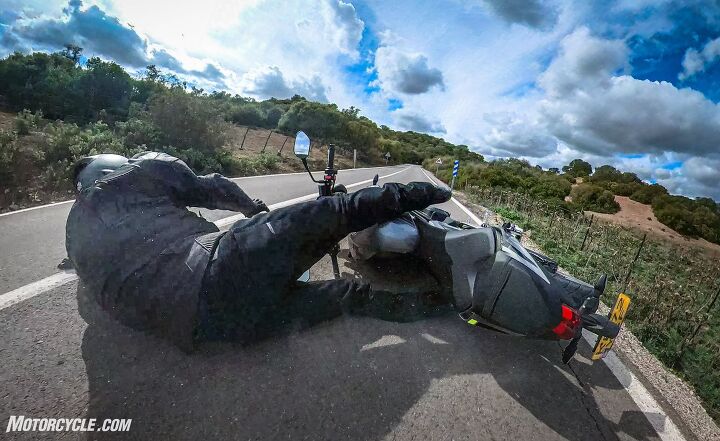
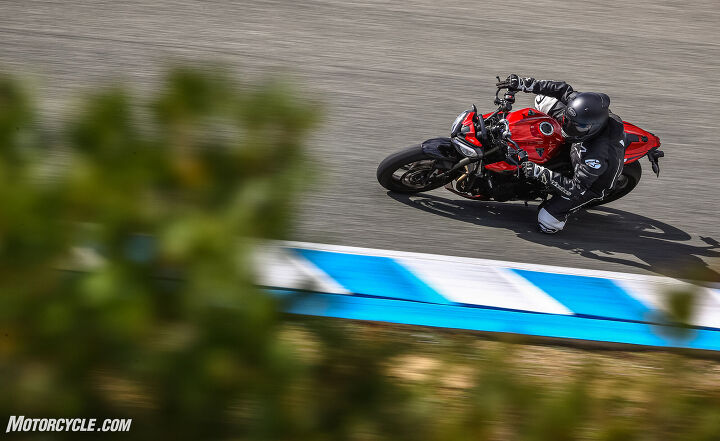
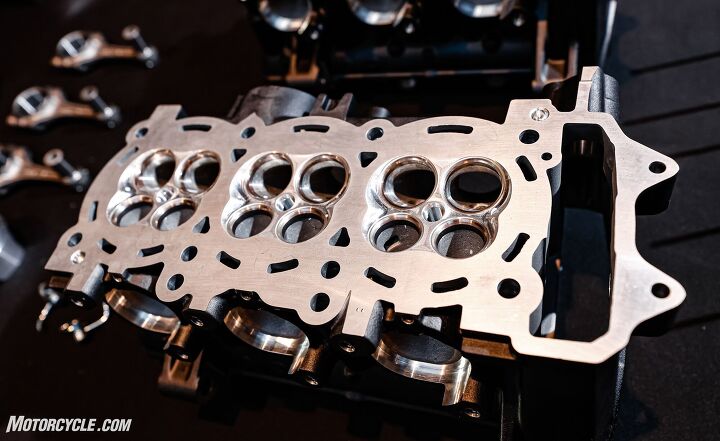
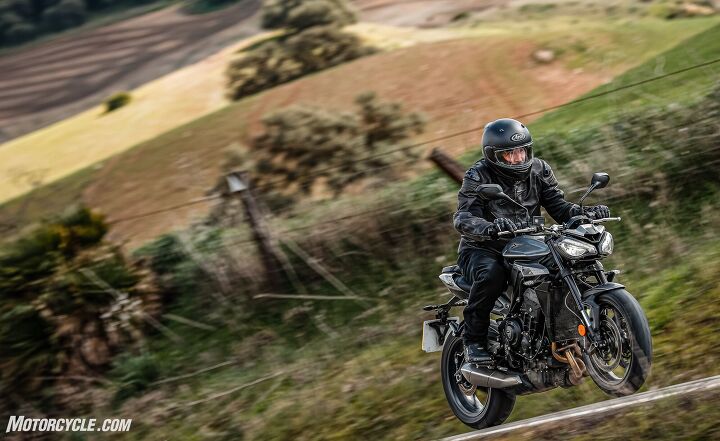
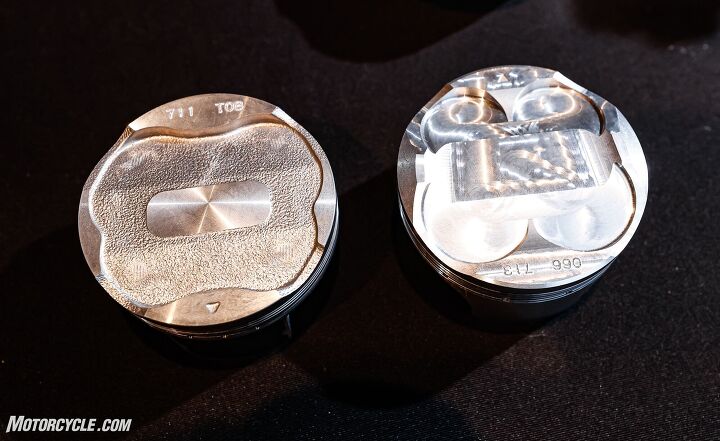
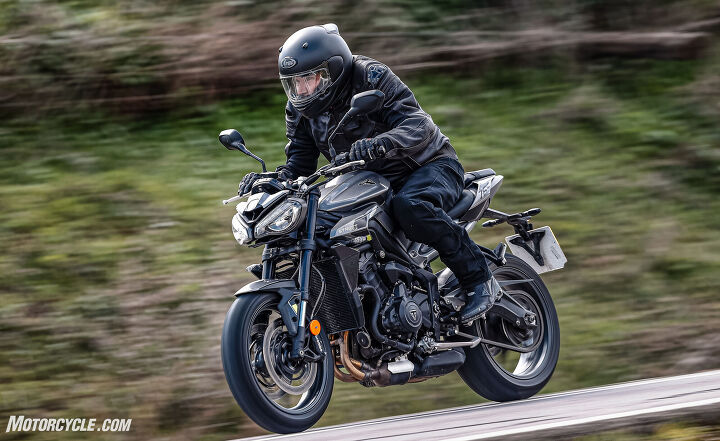
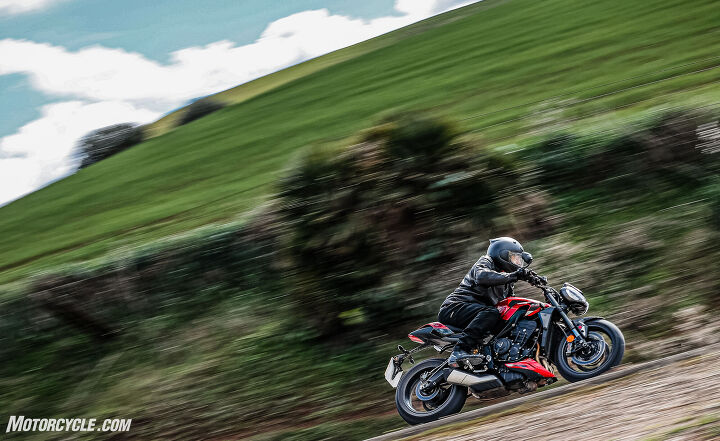
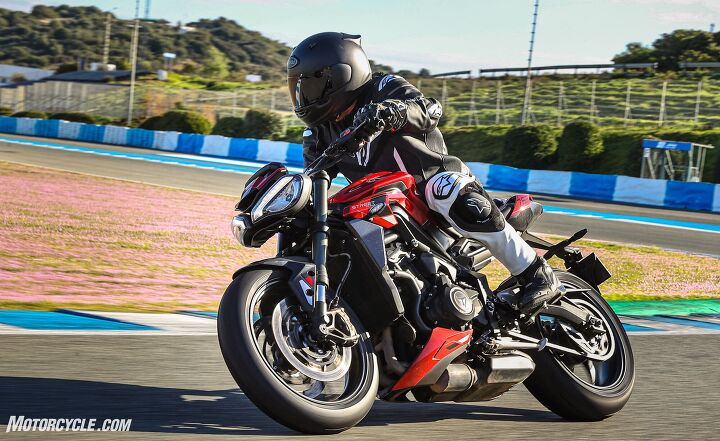
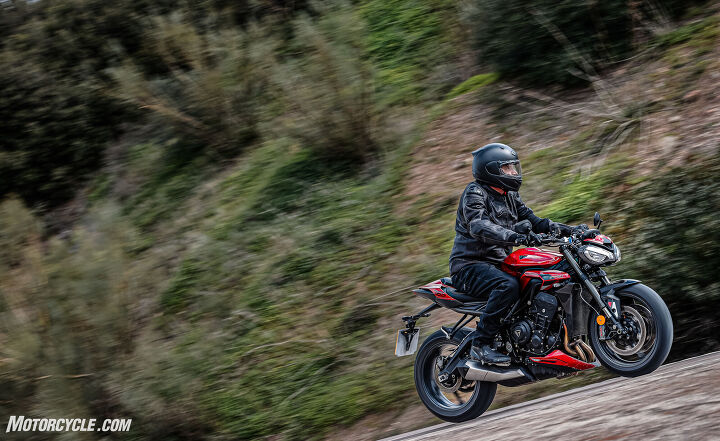

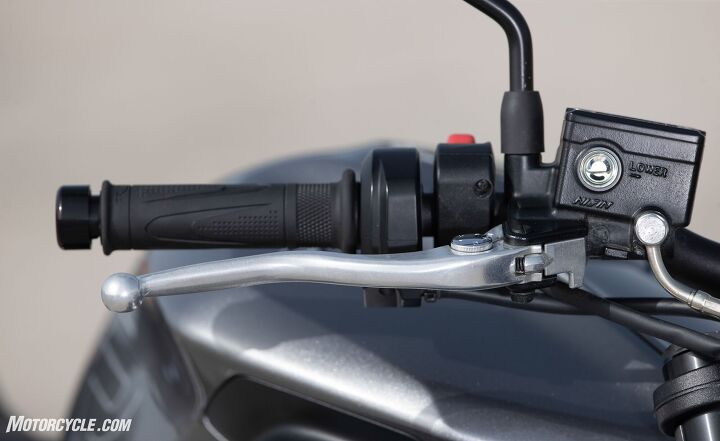
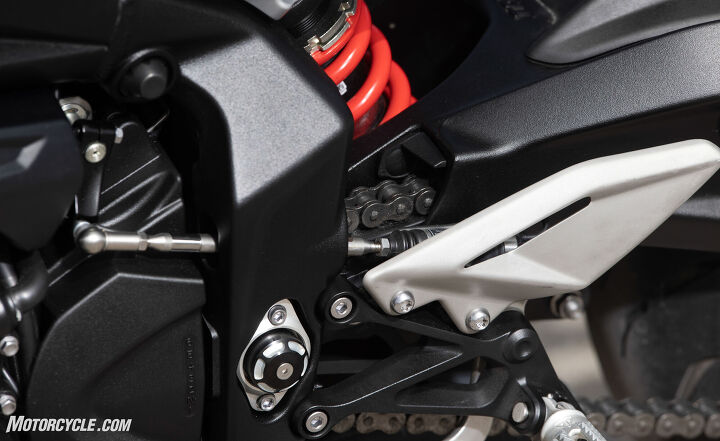
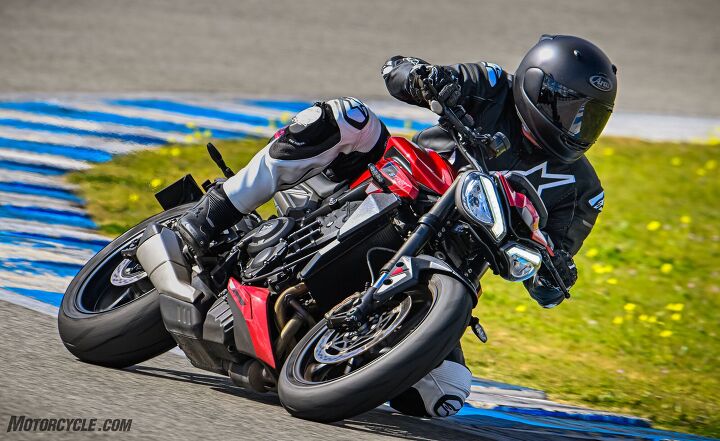
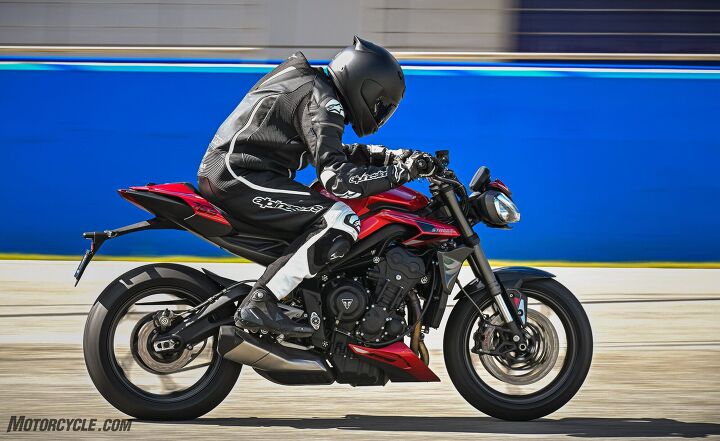
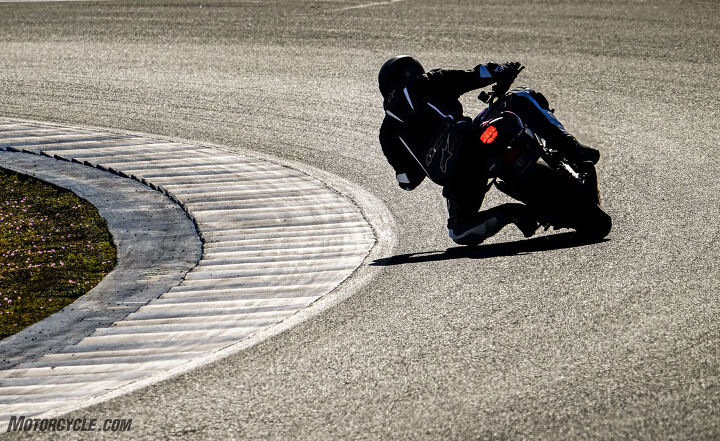
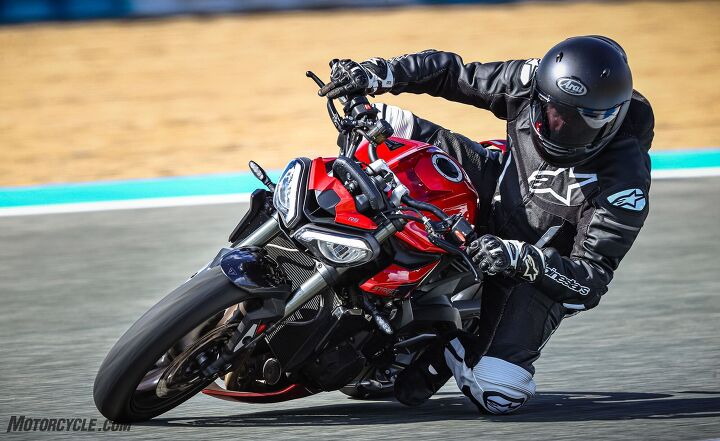
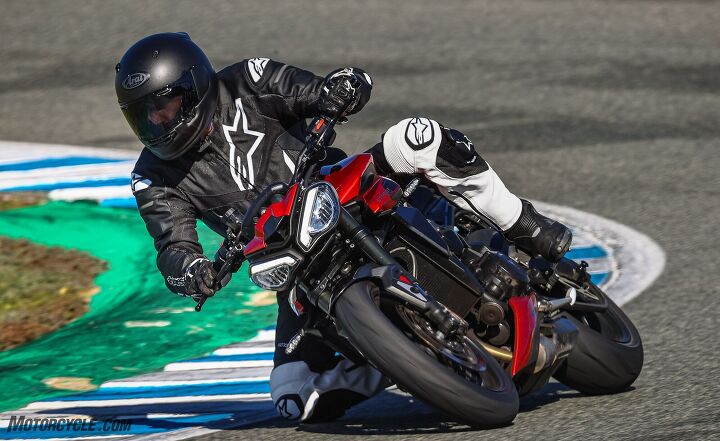
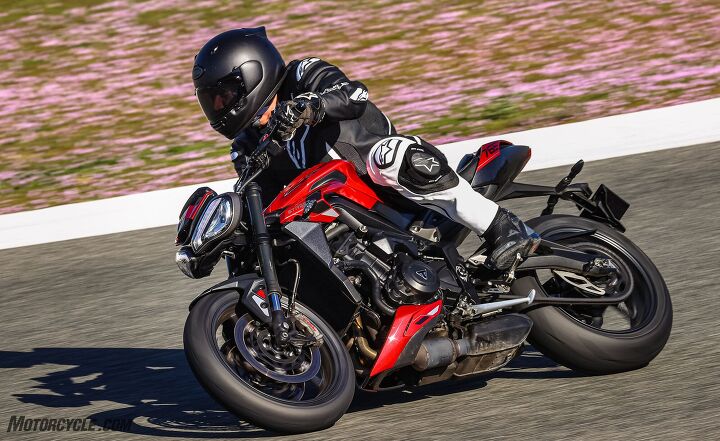
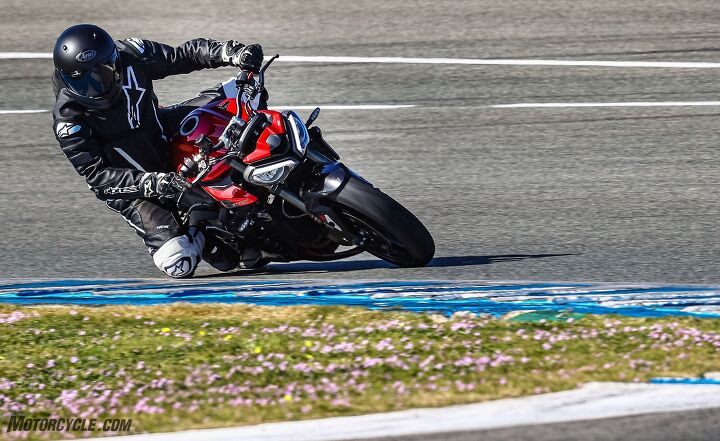
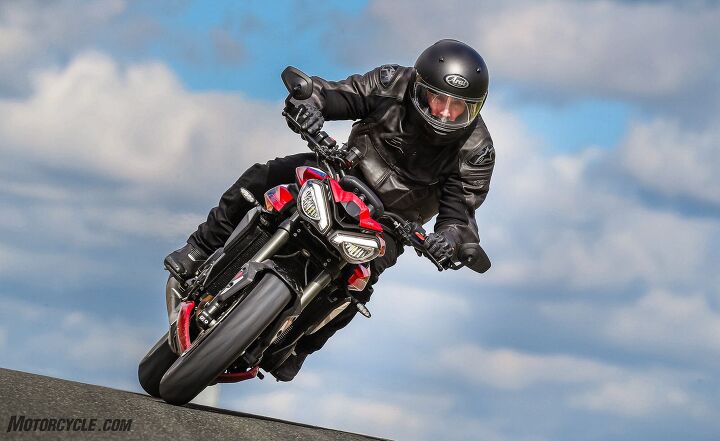
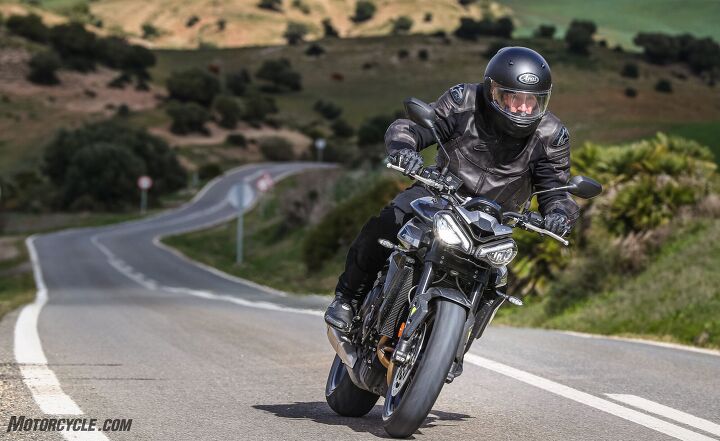
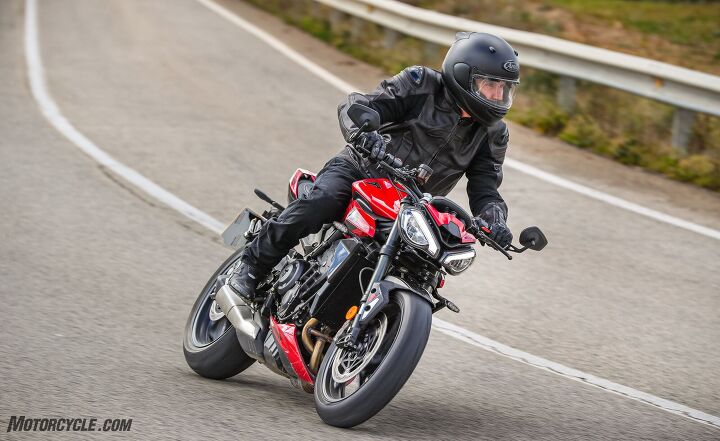
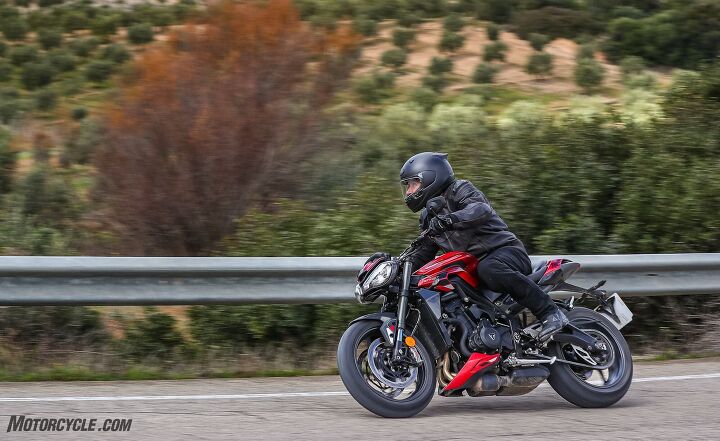
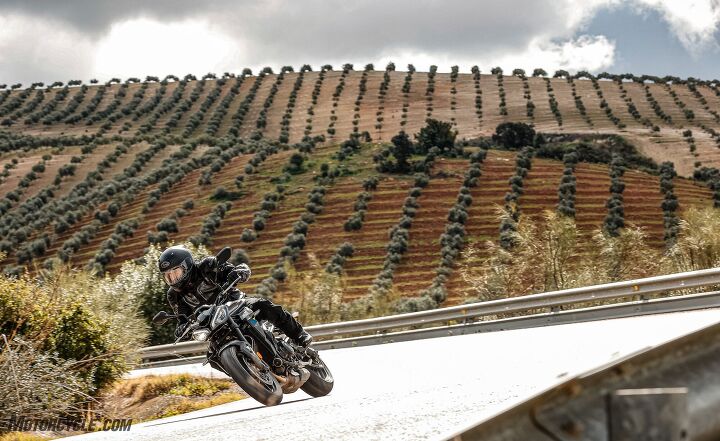
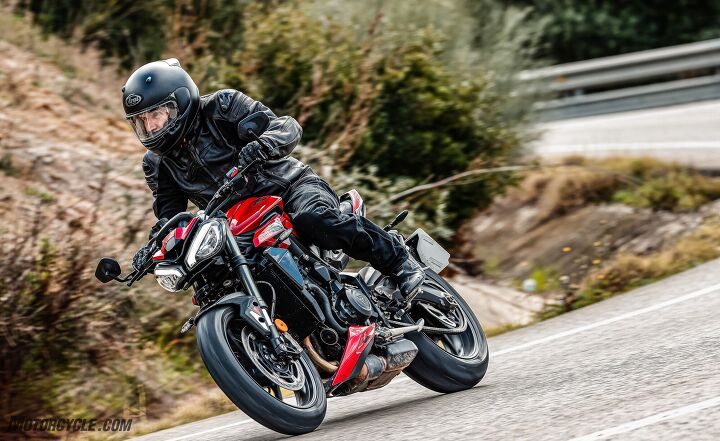
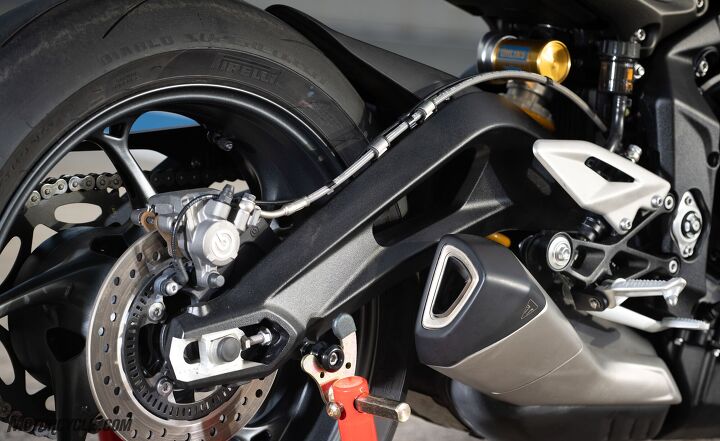
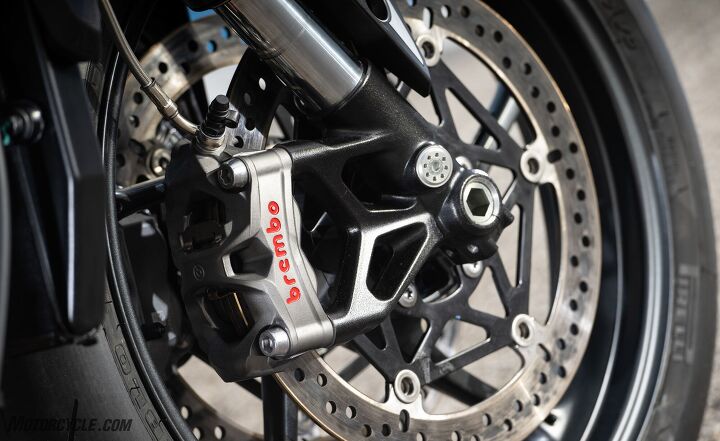
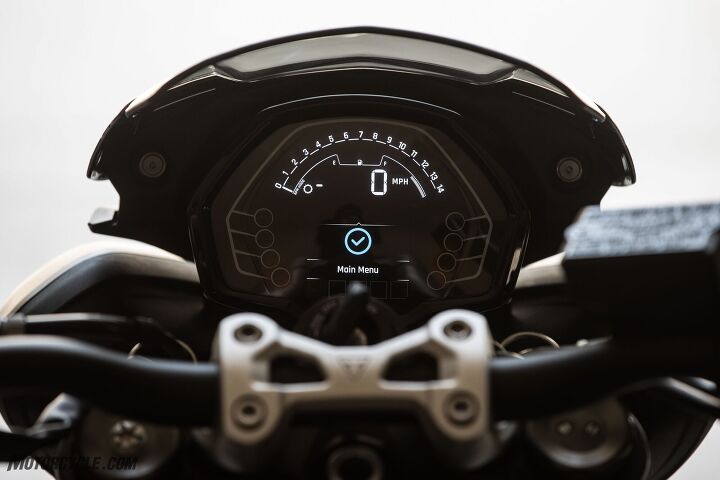
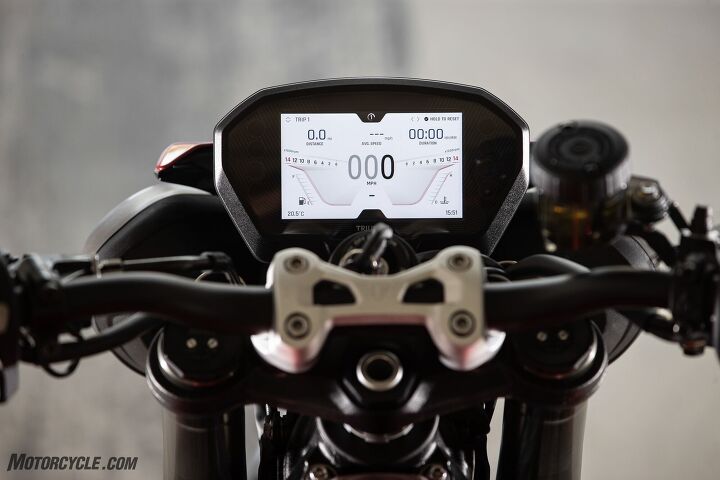
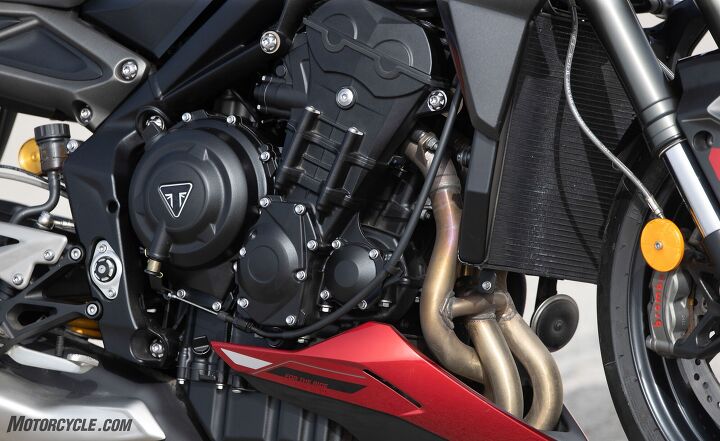
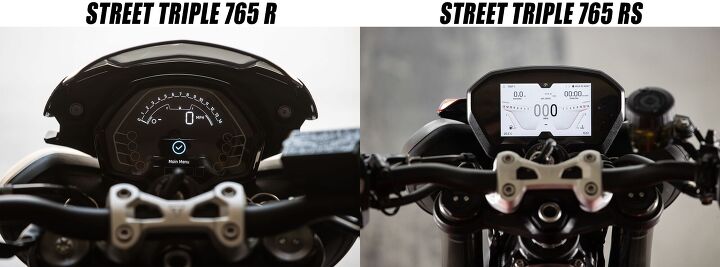

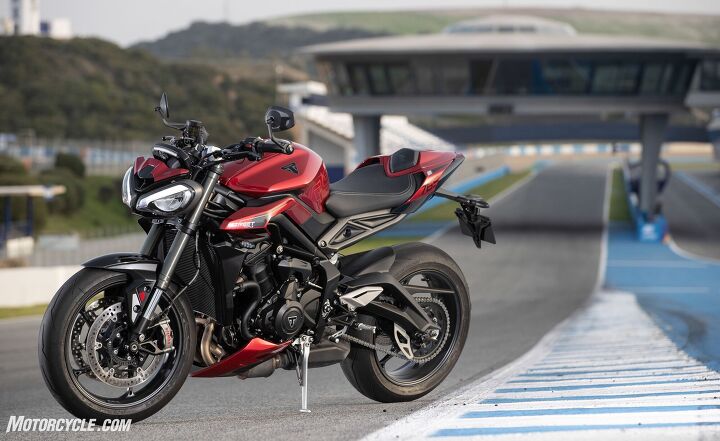
We are committed to finding, researching, and recommending the best products. We earn commissions from purchases you make using the retail links in our product reviews. Learn more about how this works.
Become a Motorcycle.com insider. Get the latest motorcycle news first by subscribing to our newsletter here.
The post 2024 Triumph Street Triple 765 R/RS Review – First Ride appeared first on Motorcycle.com.
Copyright
© Motorcycle.com


